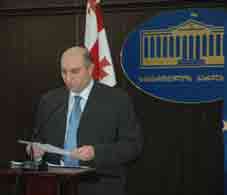Russia carried out well planned intervention in Georgia - War Commission
By Etuna Tsotniashvili
Friday, December 19

The report says that in spite of reliable intelligence data the Georgian authorities did not expect such a large scale aggression as that which took place in August 2008. According to the report, Georgiaís National Security Council could not make an adequate analysis of the situation within an appropriate timeframe and as a result it had to deal with a force majeur situation.
The report also says that almost all the relevant high ranking figures had some kind of information that the situation would be worsened and there would be some kind of escalation of tension, but could not make a proper analysis. The report says that all the important allies of Georgia were sure that attack by the Russian Federation was excluded.
According to the Commission the members of the National Security Council already had information about Russians entering Georgian territory via the Roki Tunnel on August 7. This information was released by the Ministry of Internal Affairs on the same day. But the Commission said that giving information to society was not so intensively done. Government members explained that this was because they were attempting to swiftly localise the conflict, but on August 8 Russia bombed Georgia.
According to the Commission, strategic direction was wrongly given in a crisis situation. There were important failings in the military system. In spite of the fact that the Army was provided with good and modern equipment many practical errors were made.
The Commission writes that the reservist system was found to be totally inadequate, and the full resources of the military system were not used. The Commission says the Ministry of Defence was ill prepared and did not coordinate information adequately. The Commission also said that the Foreign Ministry had no special plan or written instructions for Ambassadors outlining what should be done in emergency situations.
Discussing the high ranking personages who left the country during the war period, the Commission found that none of these left the country without the President or Prime Ministerís order. The Commission says that all state officials who were on holiday in August returned to the country during the war. During the conflict only the Energy Minister, who left for Azerbaijan, and the Foreign Minister who went to Brussels, left the country under the Presidentís order.
The report says that the Prosecutor General will study the case of former Ambassador to Russia Erosi Kitsmarishvili, due to some controversial statements he made during his interrogation
The Temporary Parliamentary Commission offered 12 recommendations to Government in order to eradicate the failures it had identified. The Commission recommends that the national security concept is revised by the National Security Council in order to take into account existing risks. The National Security Council should develop an adequate system for early warning of any danger, and together with the Government should develop a joint crisis management concept. The National Security Council, Government and Ministries should develop adequate strategies for communication during times of crisis and the National Security Council and Government should revise the civil defence concept and make adequate security plans for civilians. The system of training and mobilising reservists should be totally revised.
The Ministry of Defence should pay serious attention to communication problems. The Georgian Government should take some measures to restore its air defence system. Crisis instructions for Georgian diplomats should be developed, intensive attention should be paid to attracting qualified personnel to the diplomatic service, Parliamentary Committees should actively monitor the fulfilment of recommendations and, according to the conclusions the Commission has drawn, staff changes in the political as well as military authorities should be made.
